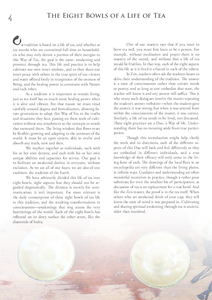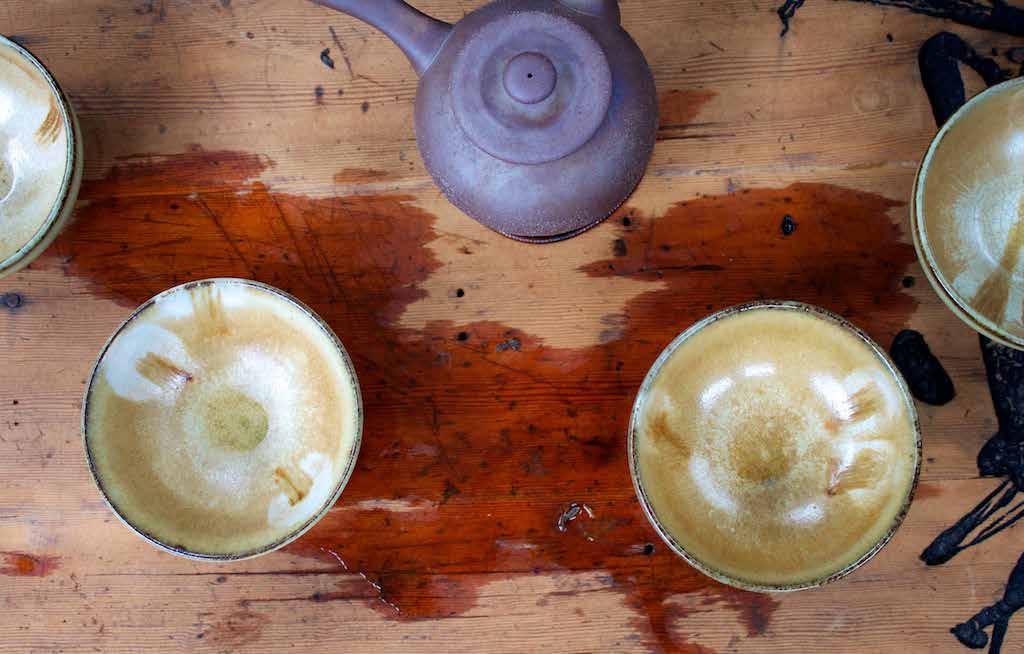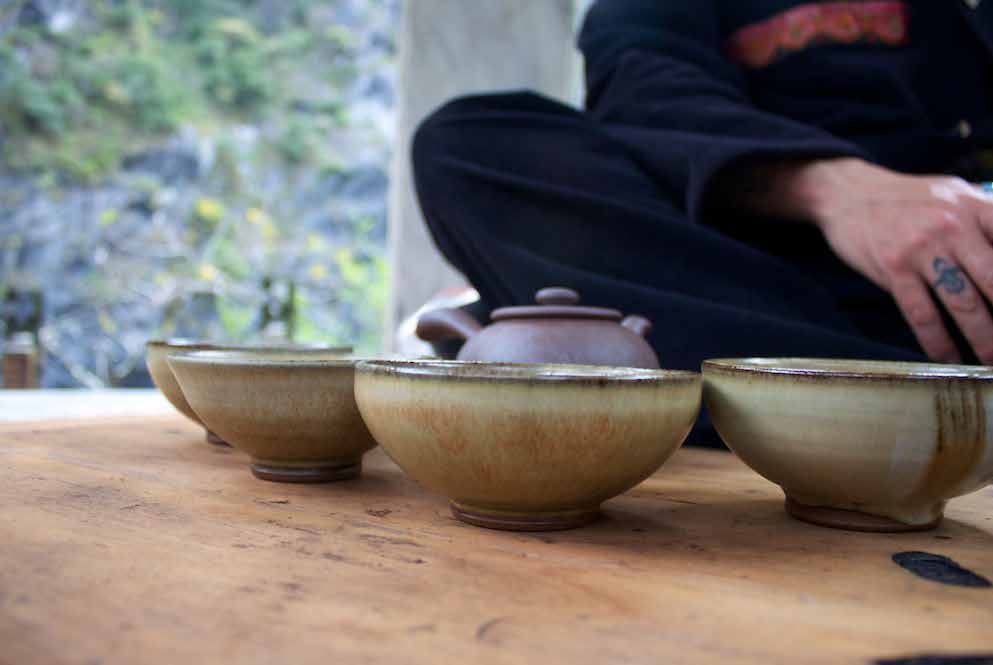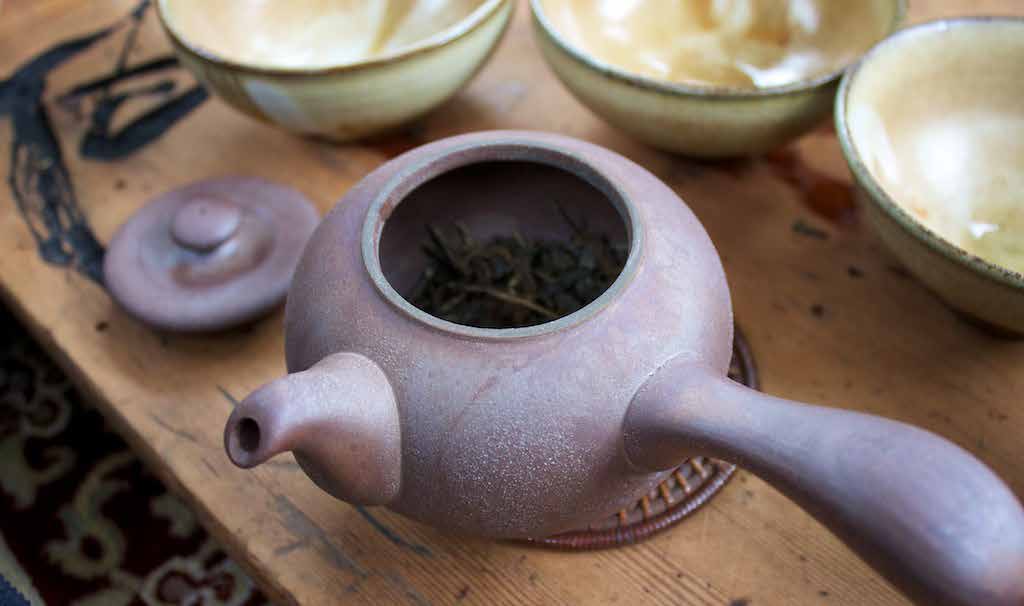
 |
|
Our tradition is based on a life of tea, and whether as tea monks who are committed full time or householders who may only devote a portion of their energies to this Way of Tea, the goal is the same: awakening and presence through tea. This life and practice is to help cultivate our own inner wisdom, and to then share our inner peace with others in the true spirit of tea - leaves and water offered freely in recognition of the oneness of Being, and the healing power in commune with Nature and each other.
As a tradition it is important to remain living, just as tea itself has so much more healing power when it is alive and vibrant. For that reason we must tread carefully around dogma and formalization, allowing future generations to adapt this Way of Tea to the truths and situations they face, passing on these tools of cultivation without any attachment to the concepts or words that surround them. The living wisdom that flows must be flexible, growing and adapting to the contours of the world. It must be an open system, able to evolve and absorb any truth, now and then.

We wayfare together as individuals, each with his or her own destiny, and each with his or her own unique abilities and capacities for service. Our goal is to facilitate an awakened destiny in everyone, without exclusion. As we are all of one heart, we are also of one tradition: the tradition of the Earth.
We have arbitrarily divided this life of tea into eight bowls, eight aspects, but they should not be regarded dogmatically. The division is merely for communication; it isn't important. Far more relevant is the daily consumption of these eight bowls of tea life in this tradition, and the resulting transformations in consciousness - awakenings that ring across the very heartstrings of the world. Each of the eight bowls has reflected on its dewy surface the other seven, like the diamonds of Indra.

One of our masters says that if you want to brew tea well, you must first learn to be a person. For example, without meditation and prayer there is no mastery of the sacred, and without that a life of tea would be fruitless. In that way, each of the eight aspects of this life as it is lived is a fractal in each of the others.
In Zen, teachers often ask the students koans to delve their understanding of the tradition. The answer is a state of consciousness rather than certain words or poetry, and as long as one embodies that state, the teacher will know it and any answer will suffice. This is why many such dialogues involve the master repeating the student's answer verbatim - when the student gave the answer, it was wrong, but when it was uttered from within the consciousness of the master, it was correct. Similarly, a life of tea needs to be lived, not discussed. These eight practices are a Dao, a Way of life. Understanding them has no meaning aside from true participation.

Though this introduction might help clarify the work and its directions, each of the different aspects of this Dao will look and feel differently as they are embodied in different individuals, and a true knowledge of their efficacy will only come in the living form of each. The drawings of the local flora in an encyclopedia are very different than the living plants, in infinite ways. Guidance and understanding are often wonderful incentives to practice, though a rather poor substitute for even the smallest bit of participation, as discussion of tea is no replacement for a true bowl. And like the Zen master, the proof is in the tea itself. When others who are awakened drink of your cup, they will know the state of mind it was prepared in. Cultivating and sharing spiritual awakening through tea is ancient, older than mankind.

Rather than speaking in right and wrong, involving judgment and rank, let us define morality in terms of that which is skillful, wholesome and healthy. We are what we do, and the way we treat ourselves and others affects our tea. We should consequently honor life, and not kill; avoid greed and desire, with a love of freedom from material possession. We know that our actions, words and most importantly thoughts towards ourselves and others affect our ability to live a life of tea in every way. Rather than formalizing a moral code of conduct, we practice self-effacement and recognition of the true oneness of all Being. From such an awareness, comes true love and compassion. And in that state, all conduct is pure conduct. In that way, we walk with heads held upright. Knowing oneness, there is no opportunity to behave unskillfully - life flows like tea, from empty vessel to empty vessel. 'Love and do what thy will' shall be the whole of the law.
Without mastery of the mind we shall never walk upright, no matter how wonderful our intentions. The mind is a strong and powerful elephant, able to serve or destroy the city equally. For that reason, our centers and schools will always be places of meditation, just as a life of tea in this tradition will include morning and evening meditation sessions, framing each day in peace and centeredness. Also, periodic retreats of longer duration should be held in the life of a tea wayfarer. Just as we need to plunge the dipper into the healing waters of silence every day, we also need a deeper draught now and again to balance periods of activity with stillness, doing with being. Our minds are turbid waters, and only quiet stillness can bring the clarity we seek in a life of tea. Connection between the kettle, pot and cups is completed in their emptiness, which they all share. The emptiness in the vessel is what makes it useful, connecting it to the other vessels. Like that, all great tea comes out of the meditative mind.
All liturgies are in truth consummation and proclamation of a state of being - making the invisible become visible on the physical level. We make altars to our own inner truths. Bowing to the Buddha, I bow to awakening and stillness in me. I learn humility before the Divinity in me, and then begin to learn from the wisdom of those people, places and things which surround me. Daily prayer and contemplation compliment my meditation and tea, as does academic study of inspirations of masters past and present - for in their words I find the maps to my truths, as well as the words and ways I'll need in order to articulate my experience, strength and hope to others. In study, we do not seek to ape the ways of any saint, sage or seer, The Eight Bowls but rather to find inspiration and guidance in our quest to know ourselves. In prayer, we do not seek to petition the Divine with our desires, but to recognize outwardly our ownmost truths. We seek to create a sacred space in our life that is always there to remind us of our true face. Surrounded by flowers, fruit, incense, tea and light we remember and make ceremony of the fact that we are Mother Earth, we are suffering and forgiveness, we are Buddha-nature. Proper prayer is for forgiveness, or out of gratitude for the endless blessings each and every one of us is showered with daily; prayer is for lovingkindness and the sharing of our merits as we follow this spiritual path; and prayer is to ask the Divine, or our higher self, for knowledge of the Divine will and the power to carry it out. We ask that the Divine will, not our own, unfold in our inner connection to the Dao. And having seen this path, we ask for the acceptance and courage to walk it. Tea is prepared with mastery only when it prepares itself. As in life, we must step out of the way and let the current flow through us - the way the tea flows through the pot and cups.
Reverence and purity facilitate a life of tea, and the communication of peace and wisdom through tea. Purity functions on all levels, from the body to the tea room, the spirit and the mind. We must respect the space and beingness all around us, keeping our homes, and especially our tea spaces, clean and bright so that all who come within them - including the many aspects of ourselves - will find stillness here. Even a confused or cluttered mind will find peace and cleanliness here, especially if that cluttered mind is my own. There is a profound peace in the practice of carefully laying out all your utensils for tea, and looking them over in a few minutes of meditation before you even begin. And like all truths, the tea session should leave no trace of itself - all should be cleaned thoroughly after the tea has been served and the guests departed. This applies equally to the inner level, as one should not carry around the dregs of previous sessions which only give rise to the comparative mind and prevent you from connecting to this moment. Wash away all traces of a tea when it is done. Clean thoroughly - internally and externally - so that your guests will know that there is but one encounter, one chance. In that way, true presence and connection have room to grow in your life and tea.
It is unfortunate that much of the world has taken to compartmentalizing life: body for the doctors, mind for the psychiatrists and spirit for religion. True healing is a unification of these false barriers. A life of tea is a life, and applies equally to all aspects of truth. The sacred must flow through the spirit and body, unifying and then ultimately transcending such arbitrary boundaries. What we eat affects our tea incredibly. The pure foods are either vegetarian, or that which is donated and then received by an open pure heart. We must promote physical wellbeing in order to heal the spirit as well. Tea has always been synonymous with medicine, in its purest form. We drink tea to flush the toxins from our bodies, as well as our hearts. Similarly, tea preparation involves the flow of energy through our bodies. For that reason, we practice Qi Gong, Tai Chi or Yoga to make this flow graceful, knowing that it will influence how we live and how we prepare our tea.
The only reason to seek mastery of this tea is in service of our world. Furthermore, it is perhaps paradoxical that the road to mastery itself essentially contains service, for without it mastery can never be achieved. Having cultivated inner awareness and peace, we must seek to share it with others. In recognizing oneness in the center of ourselves, we are committed to healing this world one bowl at a time. For no being can be healthy in an unhealthy environment. We are the earth, the air, the mountain and the tea; and we are the sharing. In community, we find strength and support, example and leadership. Together, we can achieve much more than any of us alone. Our tradition is forged from the combined insight of the tea masters, sages, seers and cloudwalkers from ancient times unto the present. Let us donate our time, money and energy towards promoting an awakening and healing through tea, sharing this life and Way with all beings. As a practice, service helps us break away from our self-serving plans and goals, connecting with others in our heart of hearts. We must also work towards transcending the dichotomy between sacred and profane. All that we do is our ownmost life. There is nothing which is not our Dao. We should find our livelihood along our spiritual path and travel with it, rather than seeking for wealth, fame or power outside our center. We should furthermore view our work in the world as another kind of service, offering us the chance to donate some of our resources as well as the opportunity to work on ourselves through all the responsibilities and relationships we encounter in the world. Like the lotus, we cannot survive without the mud.
The Leaf is the highest of scriptures. In tea we read sutras written not in the language of man, but that of the mountain and forest, earth and air, brook, stream, sunshine and moonshine. These leaves contain vast tomes, if we but learn to speak their language. In ancient times, it was said that a leaf fell into the Divine Emperor, Shen Nong's kettle as he sat in meditation. This legend speaks of the plant kingdom's need to be human, to reach out and teach us of our origins. In drinking bowl tea, we return to the oldest brewing method. We seek connection to the spirit of tea, as it has been drunk these thousands of years. In leaves and water, we find simple connection to Nature and roots, reaching down into the depths of our time and evolution to find our own source. In this way, we also wash away any of the pretensions associated with expertise, not allowing our training to make us feel superior, missing our only chance at connection with Nature, others and ourselves. We drink bowl tea in the shaman's hut, for healing and silence, wisdom and smoke - runes that hint at the Great Mystery these veins unlock.
Our tea life isn't just about a greater connection to Nature through the Leaf, but an attunement with our self as well. We must therefore cultivate both inner and outer harmony, a flow from the absolute into the relative. We learn this flow through the practice of gong fu tea, refining our sensitivity and grace as we prepare finer and finer tea over time. We must spend adequate time doing exercises to refine our palates, our sensitivity to tea and its Qi as well as some academic study of tea and spiritual matters both, in order to refine our intellects as well. We should be able to articulate tea and spiritual matters, and feel comfortable doing so. A mastery of tea includes a grace with all kinds of teaware, preparation, discussion and presentation. We should know dry leaves by appearance and smell and be able to prepare them with a grace and beauty that transcends the ordinary. We should strive to brew the tea the way it wants to be brewed, recognizing its inner nature and becoming a graceful part of that flow. We should also develop our aesthetic sensibilities, in recognition that beauty comes from the Divine; and that it significantly affects our ability to transform others through tea as well. A beautiful tea arrangement aids in one's transformation. All of this refinement should temper our spirits and teach us how to live in grace.
